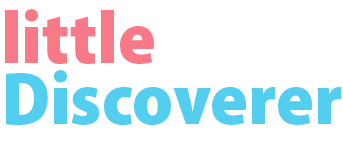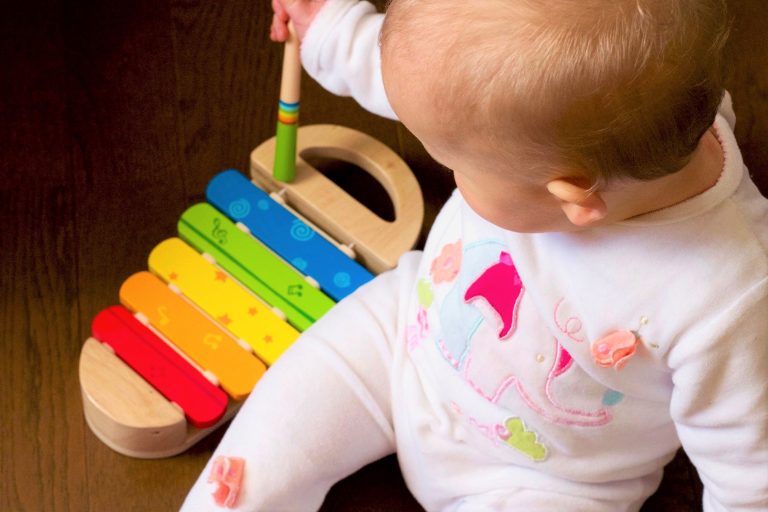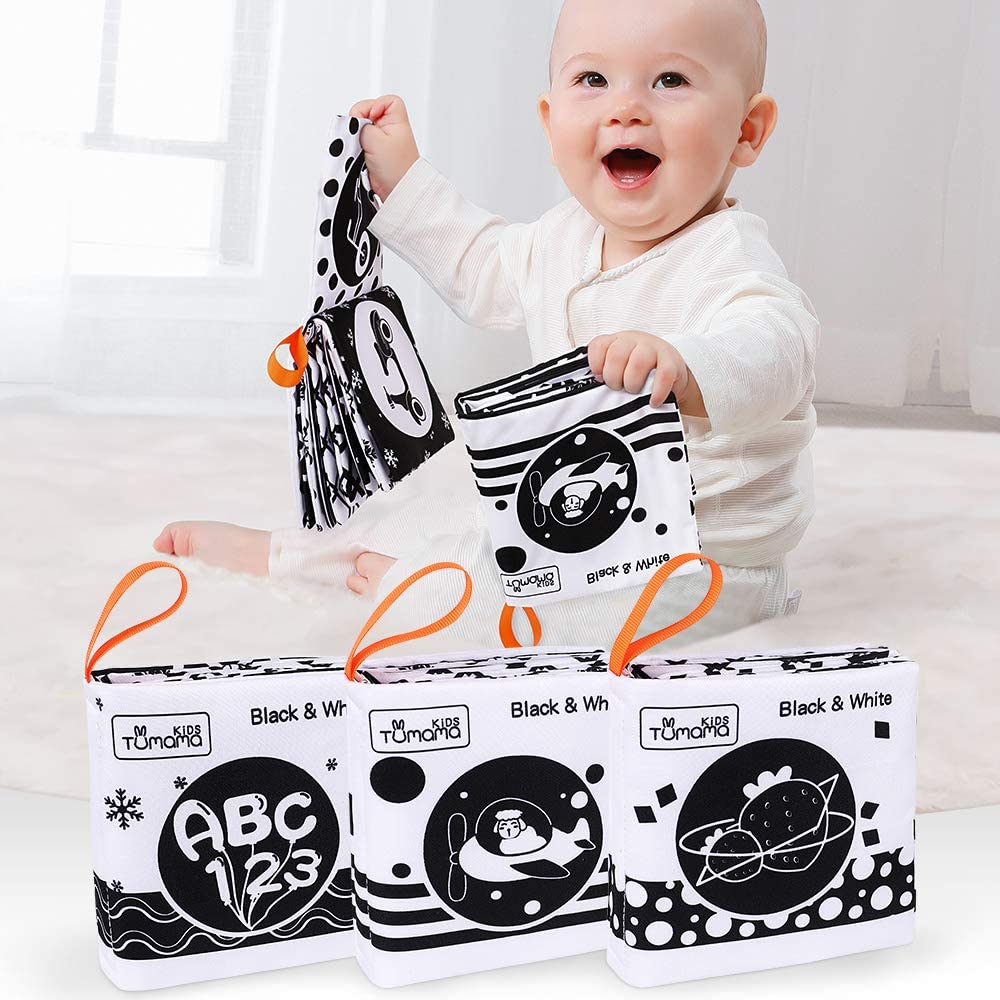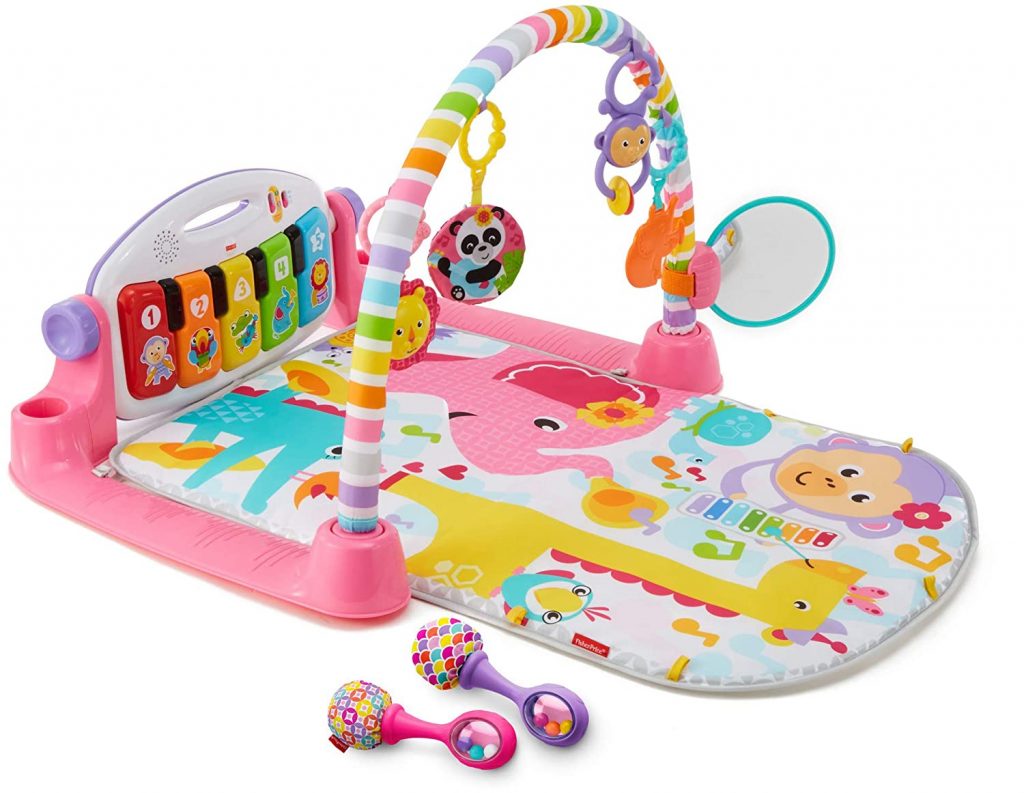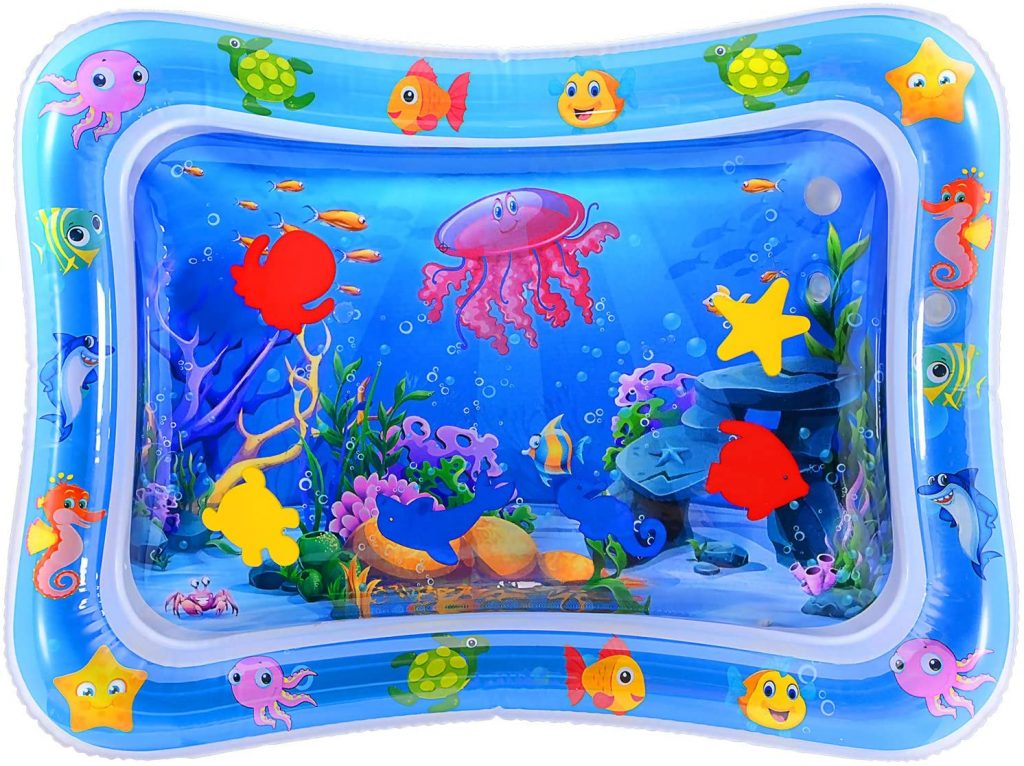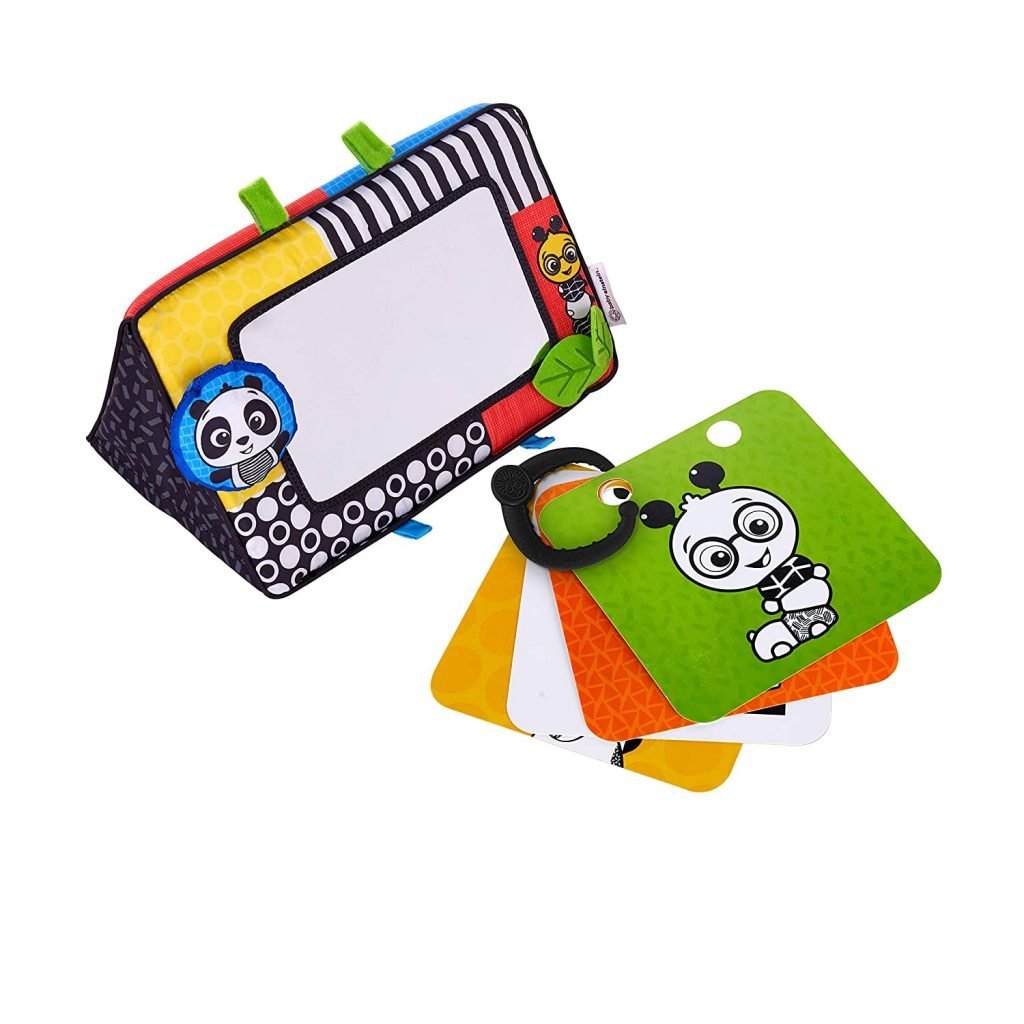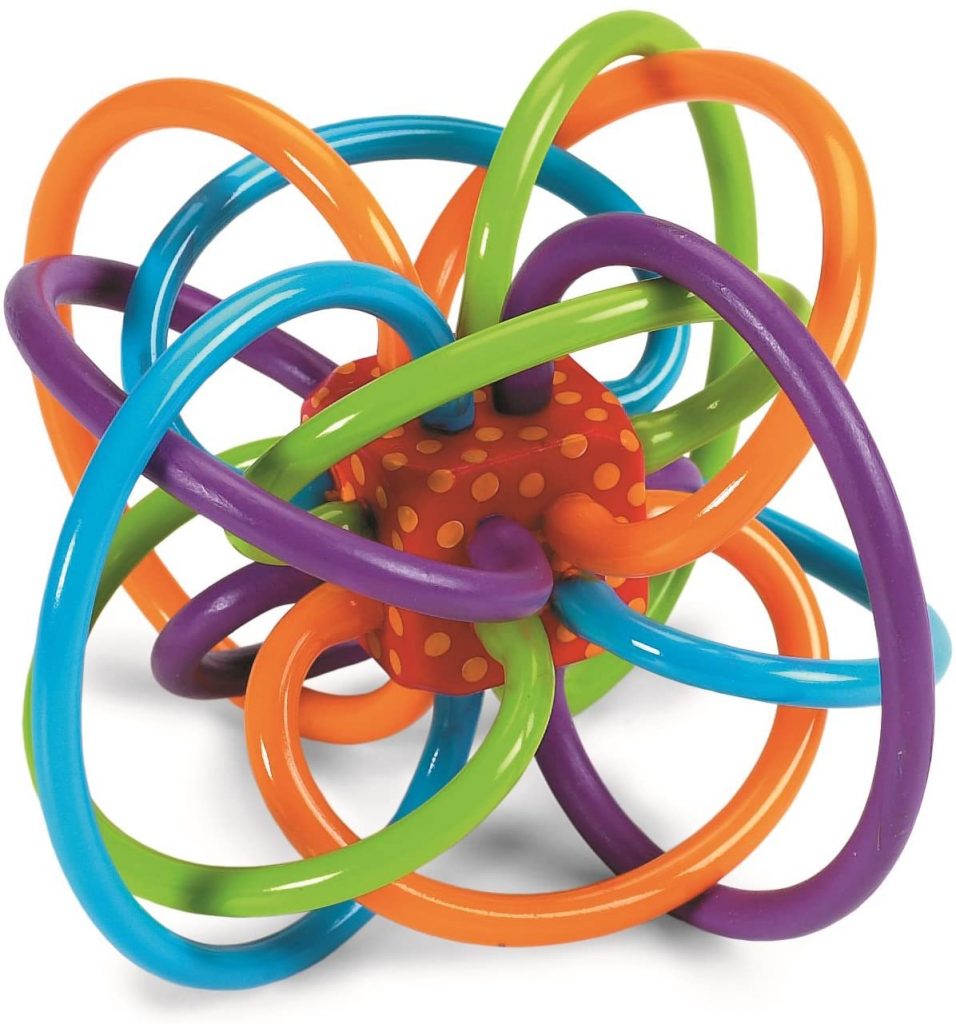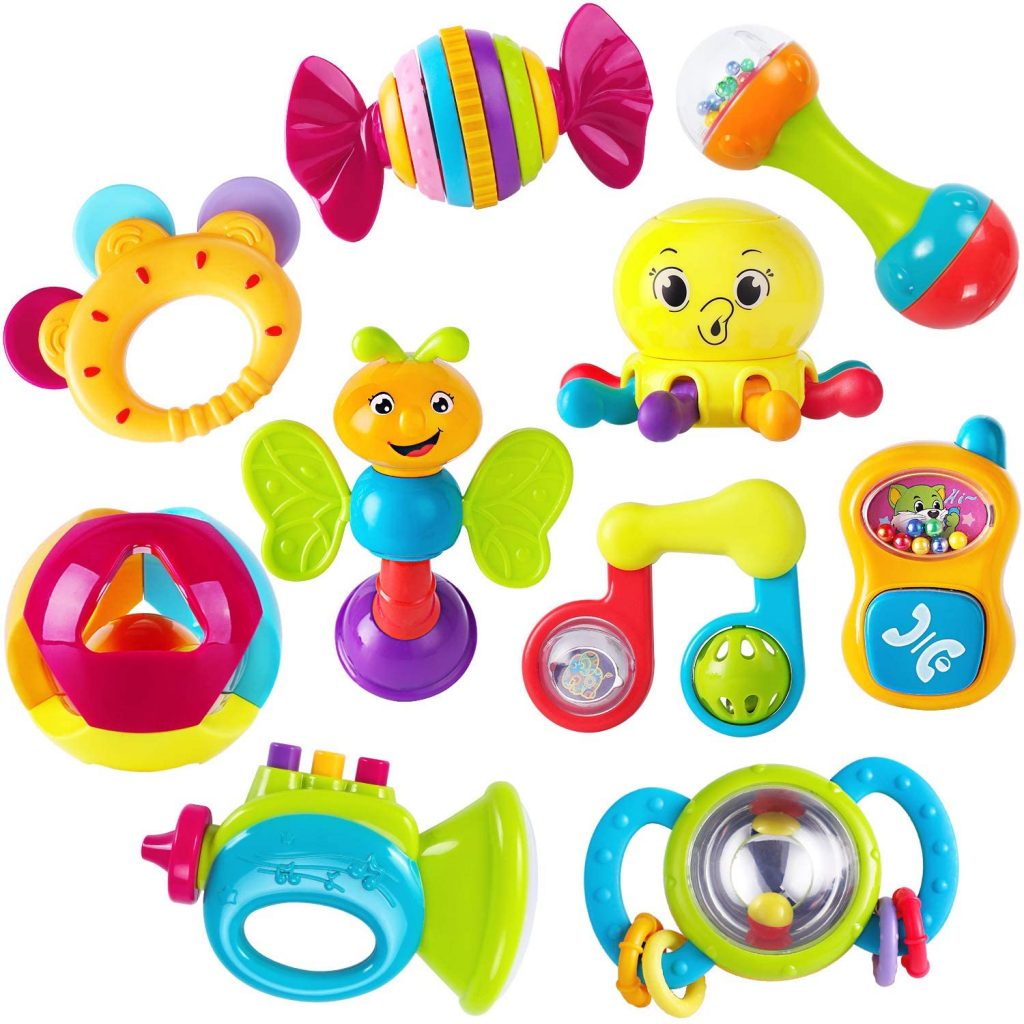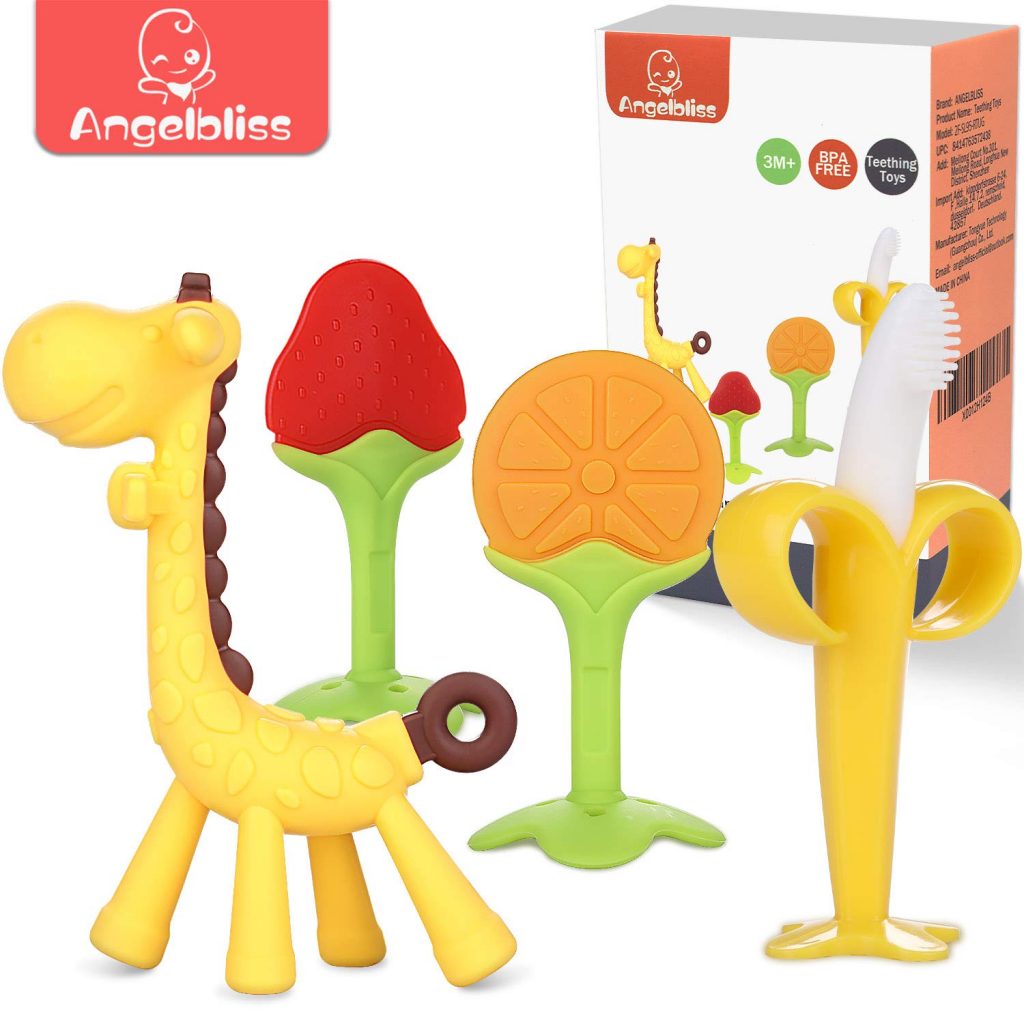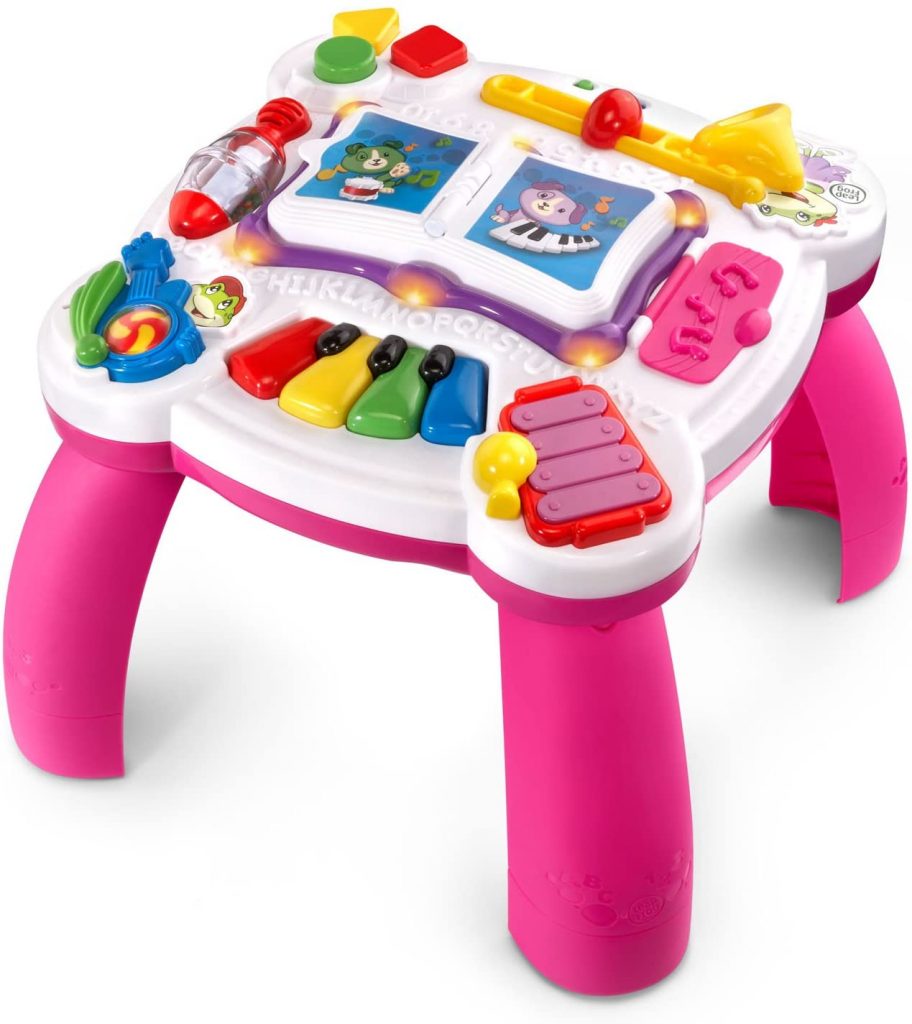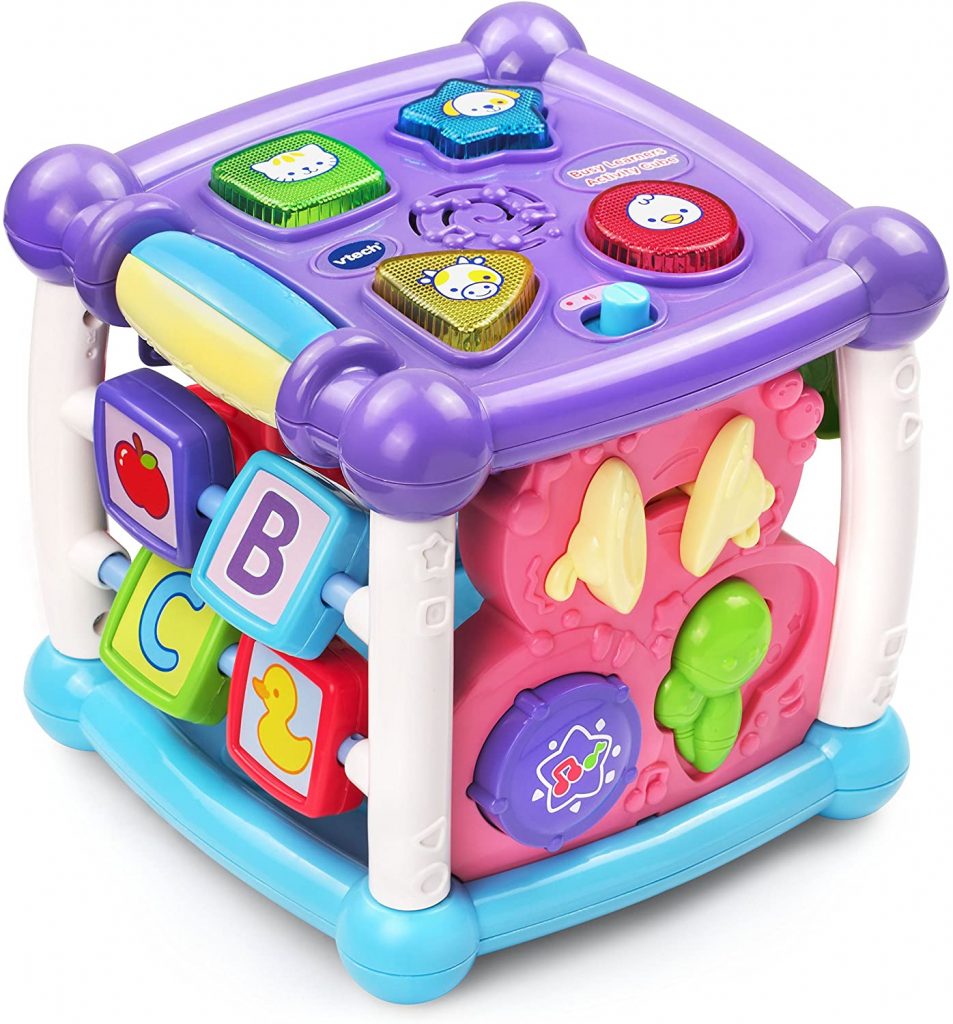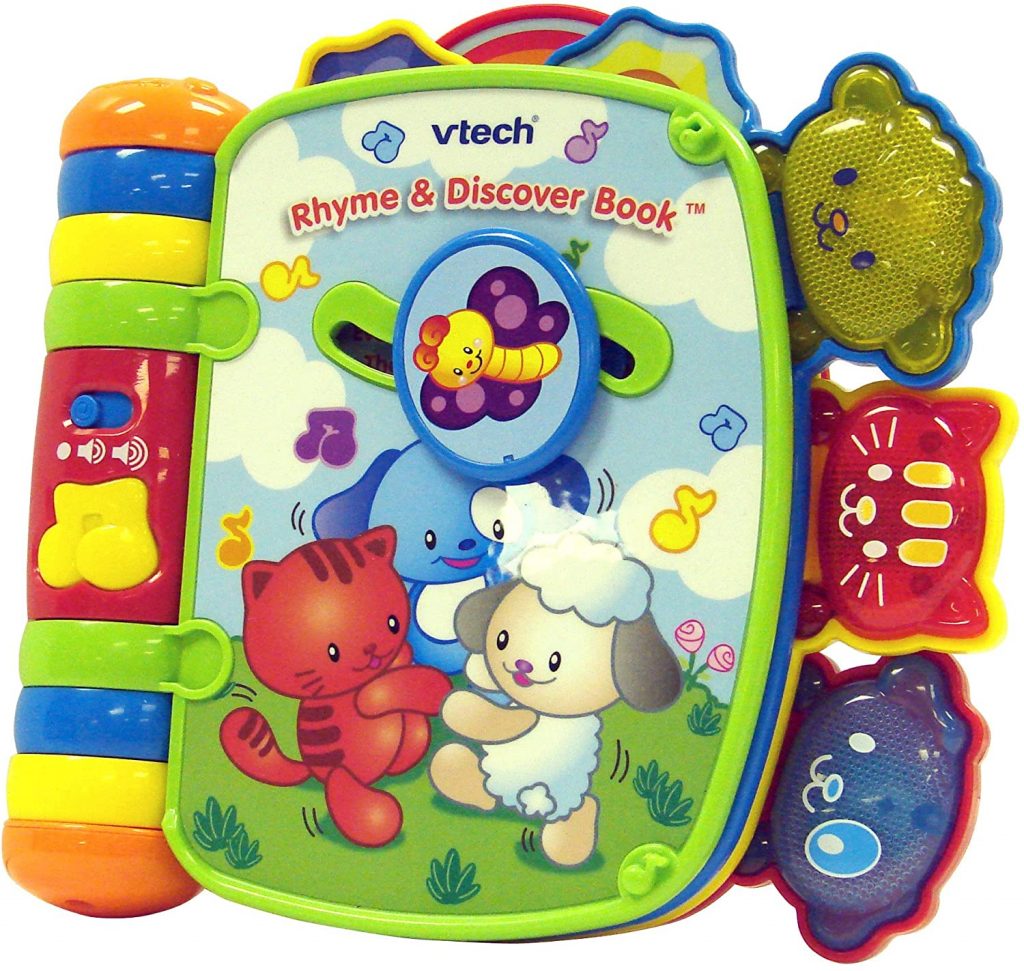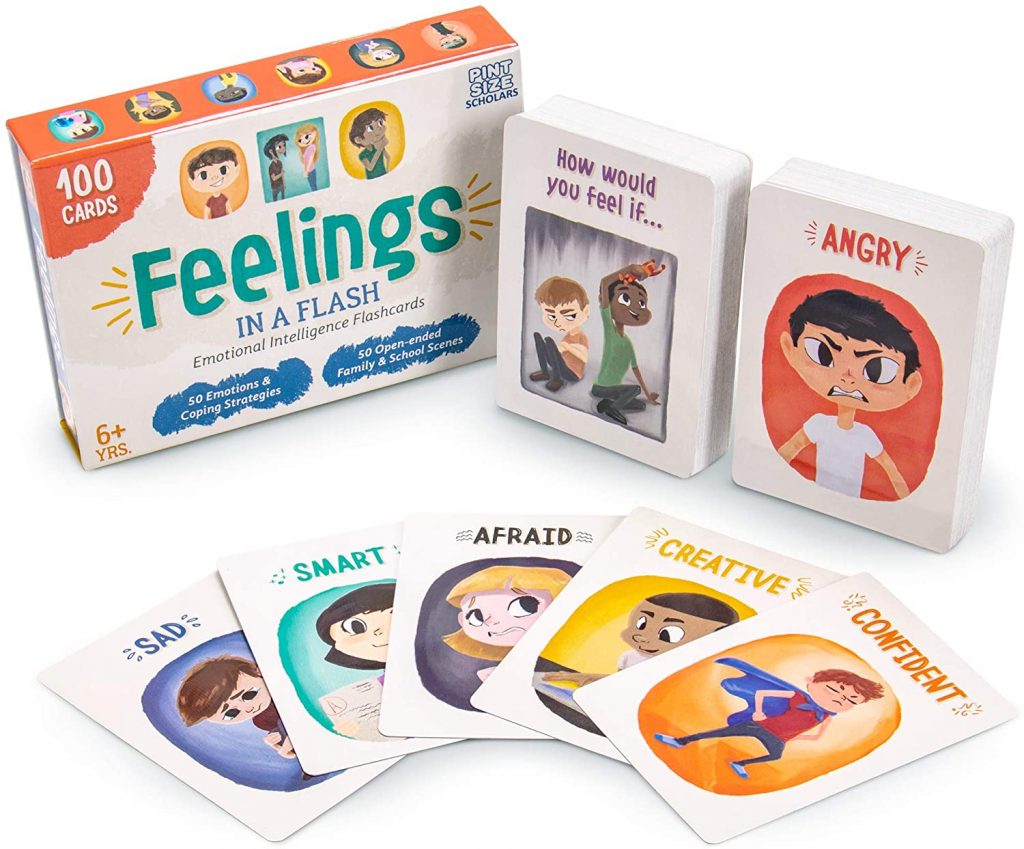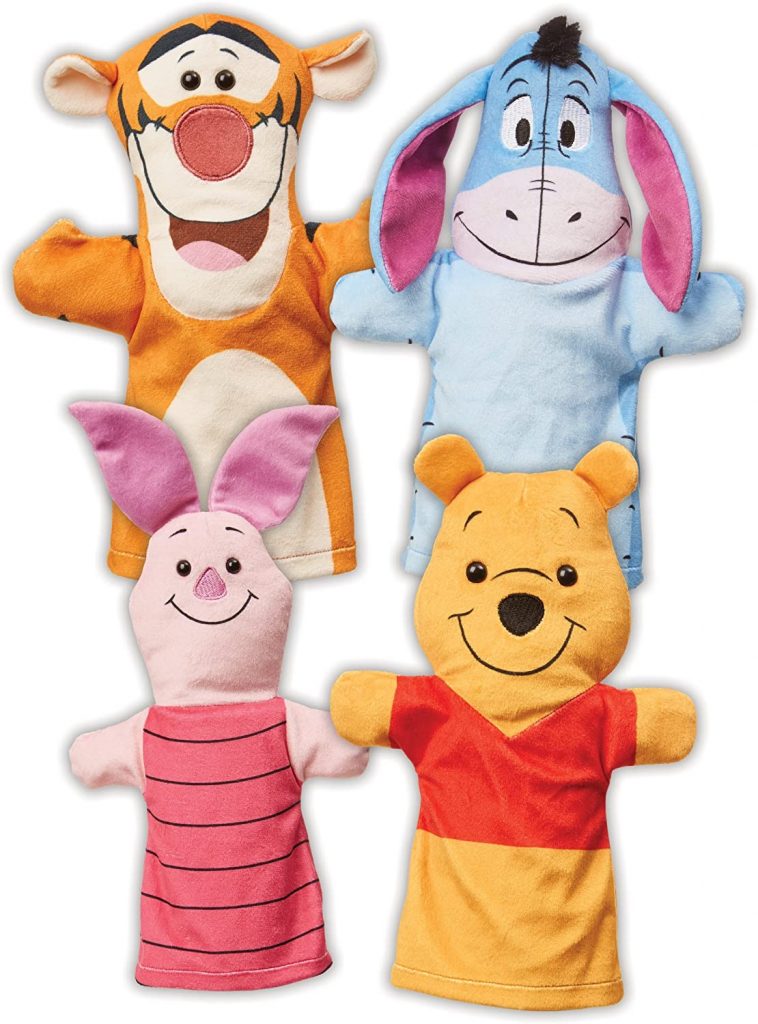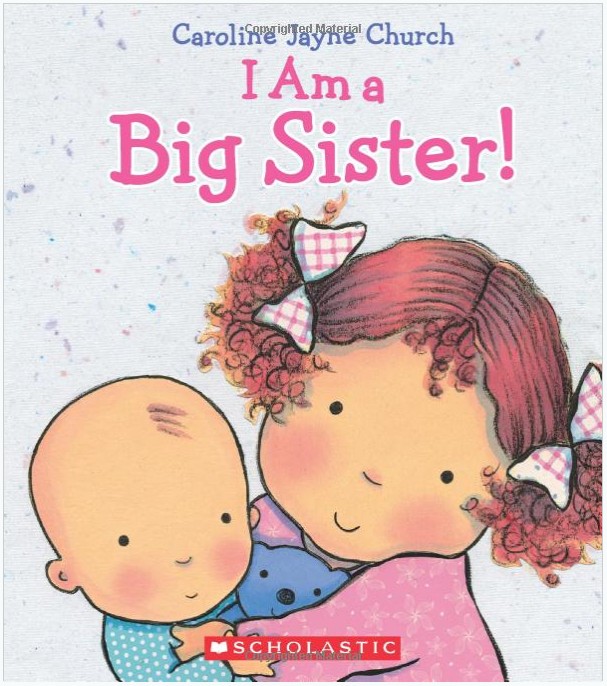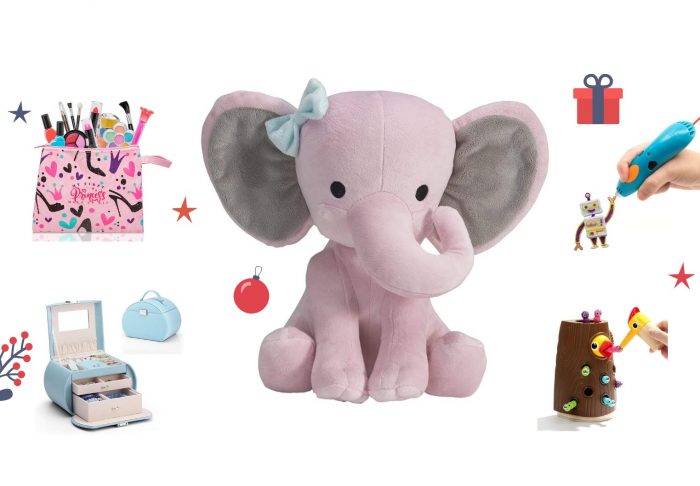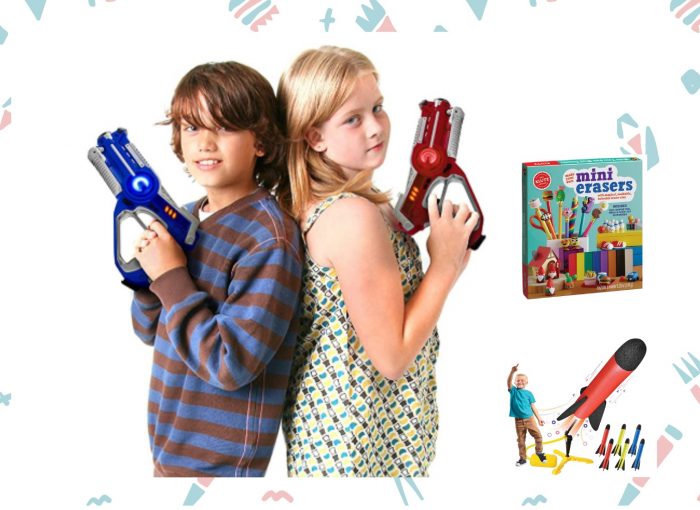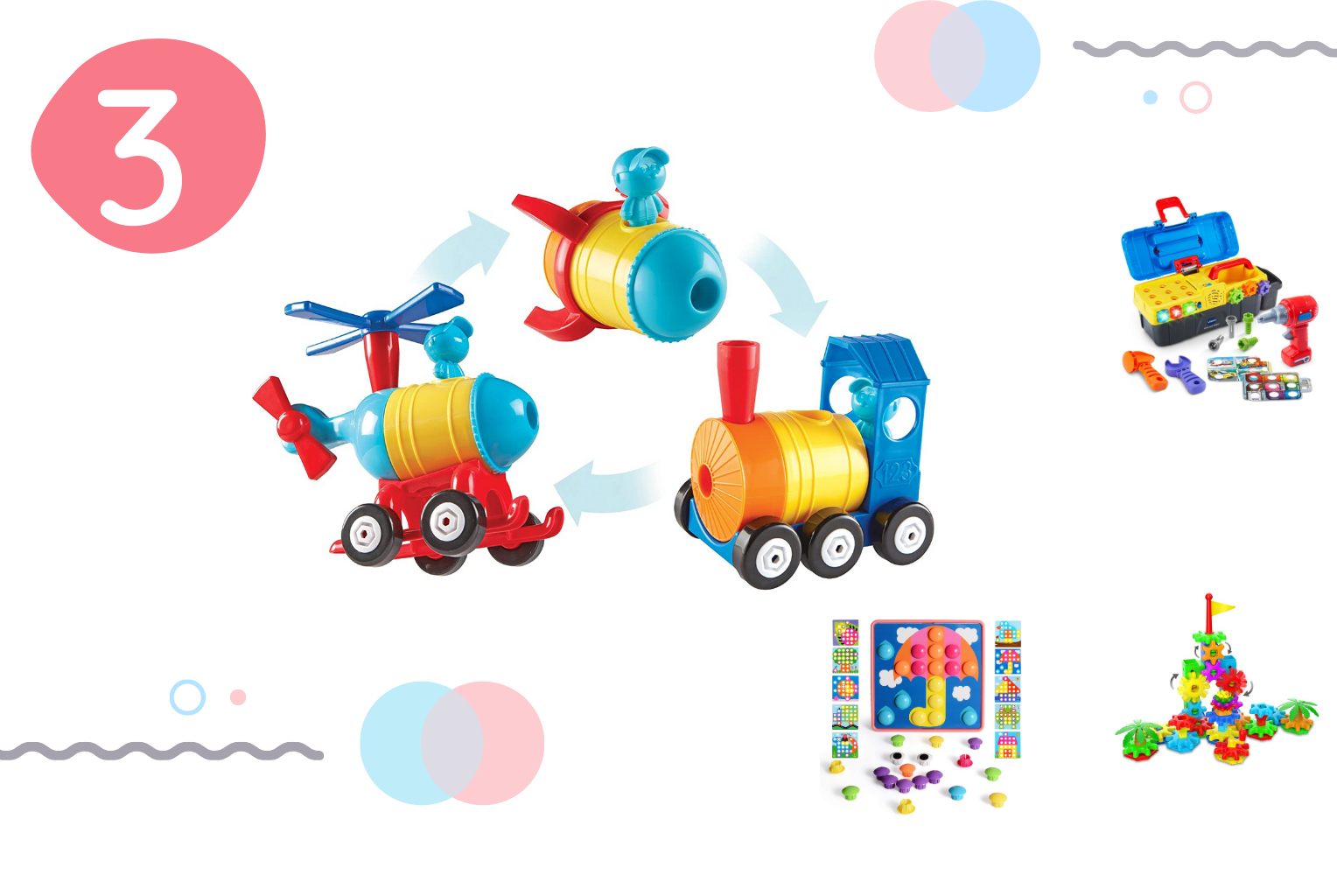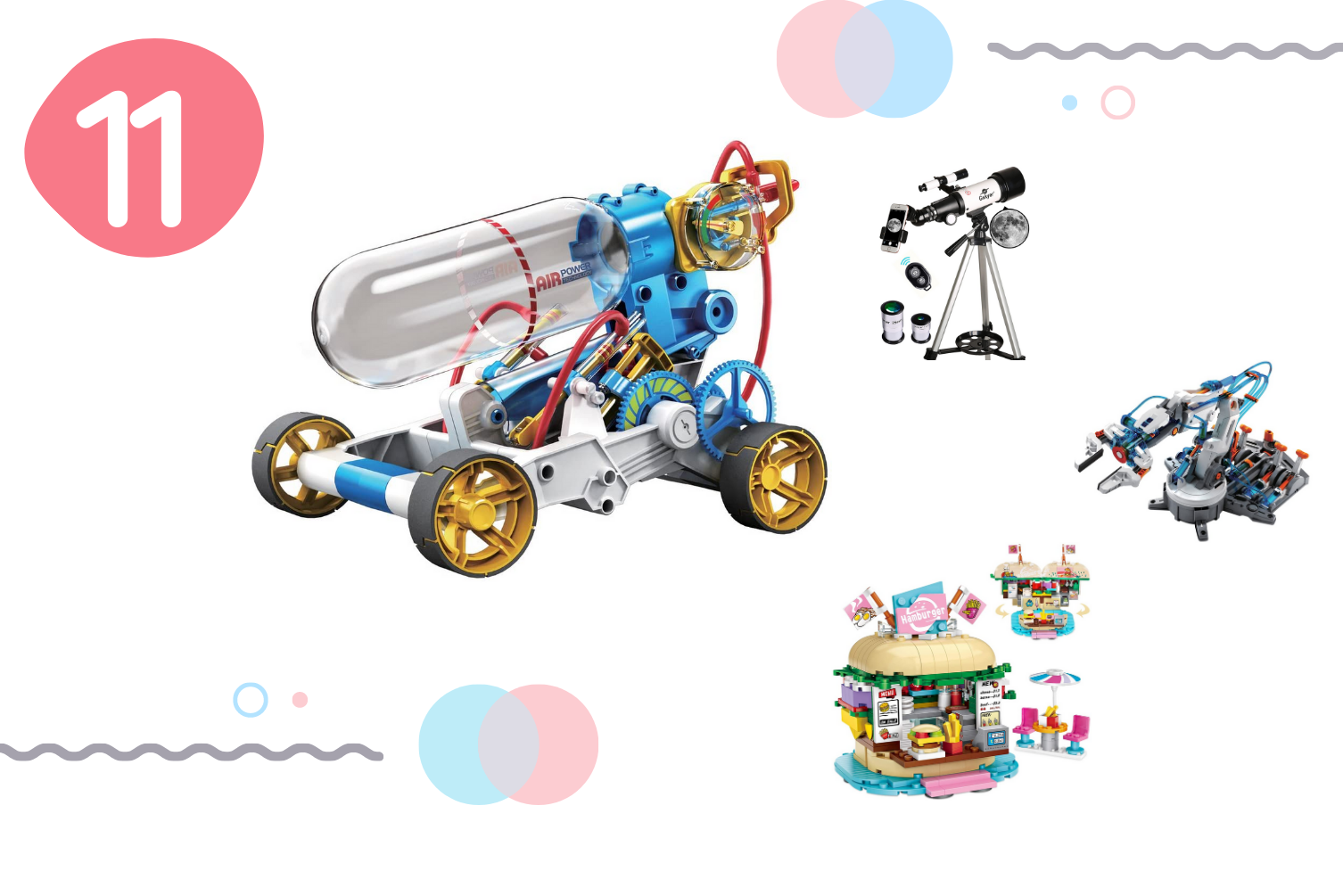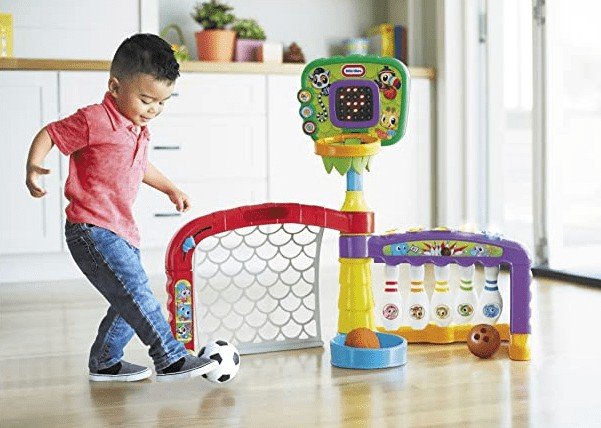You are a new parent and want to give the best to your precious baby son or daughter. However, the challenge is that there are so many first-time events in raising a newborn and you’ve never learned them at school or through work. We often hear first-time parents ask: “When do babies start playing with toys?”
The short answer to this question is: from the day they are born. The real question is, what types of toys should my baby play with at different stages of her early childhood?
That’s what this article will answer. In this guide, we will show you what toys are beneficial for your little one’s physical and intellectual development, as well as when they can start playing with these toys safely.
Read More:
- Vision Development Toys
- Gross Motor Skills Development Toys
- Fine Motor Skills Development Toys
- Cognitive Skills Development Toys
- Social-Emotional Skills Development Toys
1. Vision Development Toys
How Is My Baby’s Vision?
At birth, a newborn baby can only see 8 to 12 inches away from her face. A newborn’s retina can only detect light and dark, or black and white. They see things by following the lines where light and dark meet. This is because their eyes haven’t fully developed the physical structure for them to see clearly.
By three months, your baby will learn how to follow moving objects. They are able to track moving objects with their eyes. But their vision is still poor. The only color they can identify is red.
Why Are Vision Development Toys Important for My Baby?
Vision stimulation is very critical for activating the baby’s nerve cells. The input causes nerve cells to multiply and form a multitude of connections with other nerve cells. Lack of vision stimulation may cause underdeveloped vision and lag in a baby’s intellectual development. In addition, proper vision stimulation can spark curiosity and strengthen your baby’s nervous system.
When Do Babies Start Playing with Vision Development Toys?
You can start showing your newborn toys that feature black and white colors, or geometric shapes. As your little one grows into a toddler, you will want to choose toys that have vibrant and vivid colors. Because that’s what toddlers prefer and what keeps them engaged.
The appropriate vision development toys include black and white flashcards, cloth books, hand and wrist toys, and crib mobiles. These are some of the best vision development toys for your little one.
Best Vision Development Toys for Newborns
Best Cloth Book for Baby’s Vision Development
Benefits for your newborn
- It stimulates newborn’s vision and helps activate their brains.
- It also keeps your baby entertained and calms him down.
Best Travel Mobile for Baby’s Vision Development
Benefits for Your Newborn
- Can attach it to cribs, car seats, and strollers
- It moves to grab your baby’s attention
Best Combo Toy for Baby’s Vision Development
Benefits for Your Newborn
- Features newborns’ favorite three colors
- Multiple ways to keep baby entertained. Your baby can wear the toys and play by himself.
2. Gross Motor Skill Development Toys
How Are My Baby’s Gross Motor Skills?
Baby’s motor skills include gross motor skills and fine motor skills. Gross motor skills are a baby’s ability to use large muscle groups such as legs, arms, and trunk. Gross motor skills play an important role in enabling a baby to lift her head up, sit, crawl, and stand.
A newborn baby can briefly lift their head and turn the head left and right when lying on their back. Their hands are in fists most of the time. They don’t know yet how to move their arms. Their arms move due to a series of primitive reflexes. A newborn baby can also kick their legs. There are some experiments you can try to help assess your baby’s motor skill development.
Why Are Gross Motor Skill Development Toys Important for My Baby?
Proper development of your baby’s gross motor skills builds a great foundation for her future physical development. What’s more, these skills enable your baby to explore the world, gain a sense of freedom, and build up confidence.
When Do Babies Start Playing with Gross Motor Skill Development Toys?
You may already have heard from your pediatrician that your baby should start doing tummy time right after you take her home from the hospital. Nerve-wracking, hum? You are not alone. It takes some practice to learn to properly lay your little one on her tummy. What’s worse, it will break your heart when you see her struggling and crying.
But don’t give up, mama! Tummy time is the best way for infants to get strong necks and shoulders, which will later help them to support their heads steadily. There are many toys that can help make tummy time more fun and durable. The best and most age-appropriate toys include activity gyms, tummy time mirrors, and play mats.
Best Gross Motor Skill Development Toys for Newborns
Best Activity Gym for Baby’s Gross Motor Skill Development
Benefits for Your Newborn
- A safe play to practice tummy time
- Uses music, sounds, lights, and hanging toys to keep your baby engaged.
Related: Best Activity Gym for Babies
Best Water Mat for Baby’s Gross Motor Skill Development
Benefits for Your Newborn
- Distracts your baby from tummy time pain
- Promotes your baby’s sensory development
Best Floor Mirror for Baby’s Gross Motor Skill Development
Benefits for Your Newborn
- Babies love to look at themselves in the mirror.
- A detachable flip book featuring high-contrast colors that babies love
3. Fine Motor Skill Development Toys
How Are My Baby’s Fine Motor Skills?
Before 3 months, a baby’s movements are mostly involuntary and involve bigger muscle groups. They may occasionally swing their arms at a toy by chance, but they are not able to grab or hold anything. Your baby will start to reach for toys and grab toys between 3 months to 6 months.
Why Are Fine Motor Skill Development Toys Important for My Baby?
Fine motor skills are a baby’s ability to use smaller muscle groups such as fingers, toes, wrist, etc. Fine motor skills help babies perform more intricate movements such as grabbing, holding objects, writing, pinching, etc. Fine motor skills are important in most daily life activities and school activities. They affect a baby’s ability to use tools, write, draw, flip pages, etc.
When Do Babies Start Playing with Fine Motor Skill Development Toys?
Between 3 to 6 months is the earliest time to introduce toys for your little one to practice fine motor skills. Parents should be careful and selective about what toys to give your baby. Always check the toy manufacturers’ suggested age range. If you give household items, such as a baby washcloth, to your baby, make sure that they won’t be able to swallow the toy. In addition, always keep an eye on your little one.
Infants’ small hands are still weak and soft. They don’t yet have the ability to control their fingers well. An age-appropriate toy should be specifically designed for infants’ tiny fingers and palms. Most popular toys include teethers, rattles, and sensory toys.
Best Fine Motor Skill Development Toys for 3-Month-Olds
Best Rattle for Baby’s Fine Motor Skill Development
Benefits for Your 3-Month-Old
- Trains baby to grab using their fingers
- Baby can practice holding the rattle or passing between hands
RELATED: Best Teething Toys for 4-Month-Olds
Best Combo Rattle for Baby’s Fine Motor Skill Development
Benefits for Your 3-Month-Old
- Baby can practice grabbing, shaking, pressing, and spinning
- Each rattle has different moving parts and colors for baby’s sensory stimulation
Best Teething Toy for Baby’s Fine Motor Skill Development
Benefits for Your 3-Month-Old
- Baby can learn to hold the teether and feed herself
- Enhances your baby’s hand-eye coordination
4. Cognitive Skill Development Toys
How Are My Baby’s Cognitive Skills?
Cognitive skills are the brain’s ability to gather, process, and reuse information. They affect how babies think, remember, learn, reason, and make judgments. Though newborn babies seem to spend most of the time eating, their brains are actually processing lots of information. Newborn babies can recognize familiar voices and sounds. They also remember your smell.
But it’s not until 6 months when your little tot starts to be more aware of this world. This is when the development of her cognitive skills starts to take off. You will notice that she likes to look around, wants to grab everything, and gets bored quickly.
Why Are Cognitive Skill Development Toys Important for My Baby?
By 6 months, it is important that you start introducing new things and new concepts to your baby. Your baby will learn patterns, numbers, shapes, cause, and effect, etc. In addition, proper toys can help make your little one more curious and inquisitive.
When Do Babies Start Playing with Cognitive Skill Development Toys?
The most appropriate time to start introducing toys that promote your baby’s cognitive skills is at 6 months. Many parents are eager to start introducing learning toys to their babies right away as a newborn. Understandable, who doesn’t want to raise a smart child? However, babies under 6 months are not capable of paying attention to or understanding what you are showing. Furthermore, it often results in parents’ frustration if they cannot keep their little ones engaged. Therefore, many pediatric psychiatrists recommend that parents start introducing cognitive skill developmental toys at around 6 months.
In addition, with better motor skills and vision, now your 6-month-old is able to interact with more types of toys. Their playtime is more active and voluntary rather than passive. There are developmental toys that are specifically designed to boost your baby’s cognitive skills.
Age-appropriate learning toys for 6-month-olds include busy boards, music instrument toys, board books, activity cubes, sound books, and tablets.
Best Toys For Cognitive Skills Development
Best Musical Table for Baby’s Cognitive Skill Development
Benefits for Your 6-Month-Old
- Teaches your baby numbers, shapes, colors, and catchy songs
- Encourages your little one to explore and use her hands
Best Activity Cube for Baby’s Cognitive Skill Development
Benefits for Your 6-Month-Old
- 14 interactive features to keep your baby engaged
- Interactive activities will teach your baby cause and effect, and spark his curiosity
Best Sound for Baby’s Cognitive Skill Development
Benefits for Your 6-Month-Old
- Introduces colorful pictures and interactive sound effects
- Enriches baby’s vocabulary
5. Social-Emotional Development Toys
How Are My Baby’s Social-Emotional Skills?
Social-emotional skills are one’s ability to recognize and manage their emotions and interact with others. “The quality of a child’s early emotional experiences deeply affects the brain’s architecture and therefore a child’s long-term development,” says Claire Lerner, director of parenting resources at Zero to Three.
Newborn babies are very attached to their primary caregivers. The establishment of a healthy and secure relationship between the baby and the primary caregiver enables the baby to be more confident, secure, and compassionate.
Why Are Social-Emotional Skills Development Toys Important for My Baby?
A healthy bond between a child and his caregiver has a significant impact on the child’s future personality. In addition, strong social-emotional skills can help your baby build better emotional intelligence and learn to face difficulties and failures in the future.
The best way to strengthen a baby’s social emotional skills is to interact with parents, caregivers, and other similar-aged kids. However, not every parent has the luxury of time and social circle to create such interactions. Luckily, there are toys that can help your little one build a better social emotional understanding. Even though, they will never replace the role of interaction with other people
When Do Babies Start Playing with Social-Emotional Skill Development Toys?
Babies should start playing with toys that promote their social-emotional skills at 6 months. At this age, your baby will become more astute about different emotions. They learn to express joy or displeasure, as well as how to get your attention. These toys demonstrate ways to interact with others and help establish a positive family culture.
As we mentioned earlier, the best way to develop a baby’s social-emotional skills is by interacting with parents. But toys can help facilitate this process. Toys can make the interaction between you and your little tot more entertaining and educational.
Age-appropriate toys for 6 months’ social-emotional skills development include emotional intelligence flashcards, board books, and plush dolls.
Best Toys For Social-Emotional Skills Development
Best EQ Flashcard for Baby’s Social-Emotional Skill Development
Benefits for Your 6-Month-Old
- Introducing different emotions to your baby and raises awareness
- Facilitate meaningful interaction between babies and parents
Best Hand Puppets for Baby’s Social-Emotional Skill Development
Benefits for Your 6-Month-Old
- Interactive toy for parents to bond with babies in an entertaining way
- Encourages verbal communication between you and your baby
Best Book for Baby’s Social-Emotional Skill Development
Benefits for Your 6-Month-Old
- Teaches babies to be caring and loving
- A good way for parents to bond with babies through reading
Wrap Up
If you are questioning when your baby should start playing with toys, you are already a step ahead of other parents by being proactive. When can babies start playing with toys? The answer relies on the types of toys and your baby’s readiness for them. The best and age-appropriate toys encourage exploration, critical thinking, and help establish a sense of independence.

Dr. Pierrette Mimi Poinsett MD is a pediatrician with over 30 years of experience including 19 years of clinical practice. She is active as a medical consultant, serving as an advocate for infants, children, and adolescents with disabilities, chronic illnesses, learning differences, and behavioral issues.
